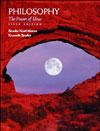 |
1 |  | 
Soren Kierkegaard believed that metaphysics could demonstrate that the world is fundamentally rational and that human life does have a clear meaning and purpose. |
|  | A) | True |
|  | B) | False |
 |
 |
2 |  | 
Arthur Schopenhauer thought that human actions are driven by a blind, purposeless will. |
|  | A) | True |
|  | B) | False |
 |
 |
3 |  | 
Existentialists believe that most people lead dull, senseless, trivial lives filled with anguish and despair. |
|  | A) | True |
|  | B) | False |
 |
 |
4 |  | 
Existentialists also believe that philosophy should focus on the big picture, not on individuals and their confrontation with the world. |
|  | A) | True |
|  | B) | False |
 |
 |
5 |  | 
For Albert Camus, suicide is a better option than simply rebelling against the absurdity of life. |
|  | A) | True |
|  | B) | False |
 |
 |
6 |  | 
Jean Paul Sartre thought that humans come into existence already with a purpose to their existence and thus a meaning to their lives. |
|  | A) | True |
|  | B) | False |
 |
 |
7 |  | 
According to Sartre, humans are both thrown into existence and condemned to freedom. |
|  | A) | True |
|  | B) | False |
 |
 |
8 |  | 
Edmund Husserl's "phenomenological reduction" attempts to study the stream of conscious experience without making any assumptions at all about the nature or existence of an external, objective world. |
|  | A) | True |
|  | B) | False |
 |
 |
9 |  | 
That minds and their ideas are superior to and should thus control any nonmental reality is an idea highly endorsed by Martin Heidegger. |
|  | A) | True |
|  | B) | False |
 |
 |
10 |  | 
According to the later Heidegger, we should dwell simply in Being, not in the thingafied world of modern, technical man. |
|  | A) | True |
|  | B) | False |
 |



 2002 McGraw-Hill Higher Education
2002 McGraw-Hill Higher Education